Clwyd Concwest easements
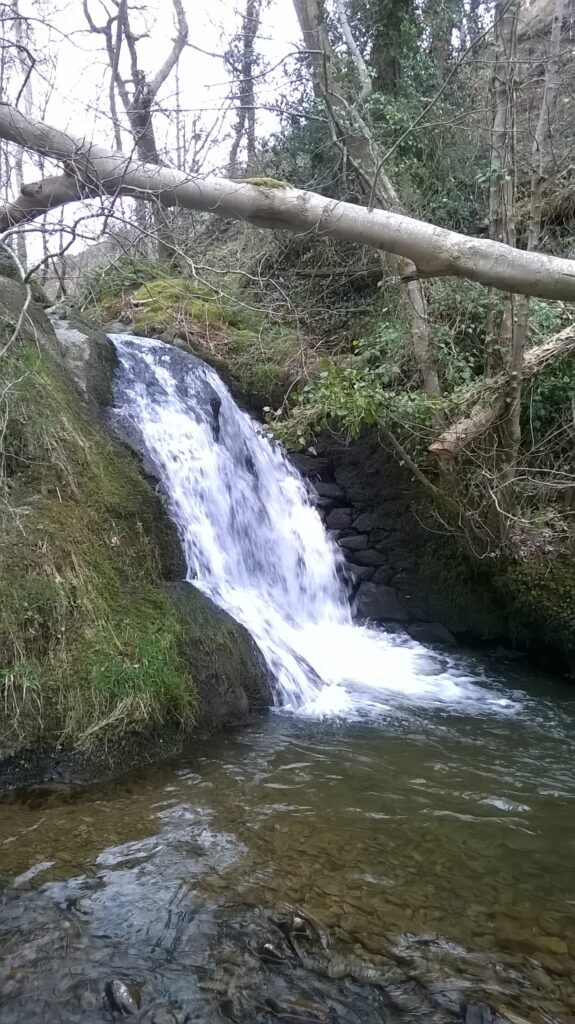
During 2020 two easements have been carried out on the Afon Concwest. These were carried out by the North Wales Rivers Trust, with funding from NRW. These easements have opened an additional 4km of spawning habitat to migratory fish.
The Concwest has suffered several pollution incidents during recent years and no juvenile salmonids have been recorded in the catchment since 2015. Following the work two large redds have already been seen above the historic barriers so this work will help to re- populate the Concwest with salmonids.
Prior to 2003 the upper Clywedog was not accessible to migratory fish due to the Bontuchel weir. The installation of the fish pass at Bontuchel, and easements on the Clywedog and Concwest, have opened the whole upper Clywedog catchment to migratory salmonids.
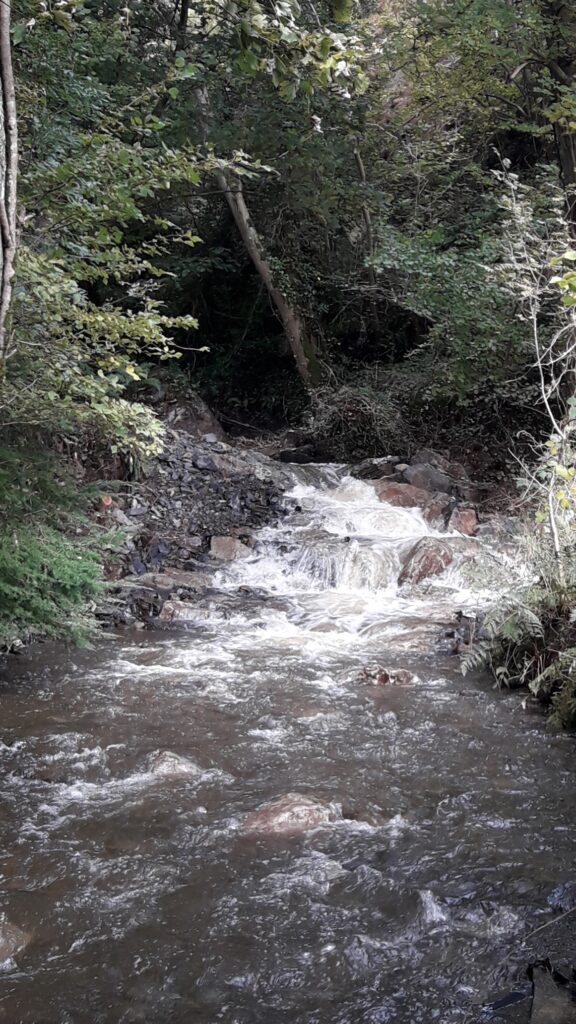
Conwy – Know Your River board updates
Information boards were placed on the Conwy catchment in 2010 to highlight possible impacts on spawning and redds from river users. These boards have recently been updated, still highlighting the possible impact from river users, but also giving the general public some interesting salmon and sea trout details, plus some local catchment specific facts.
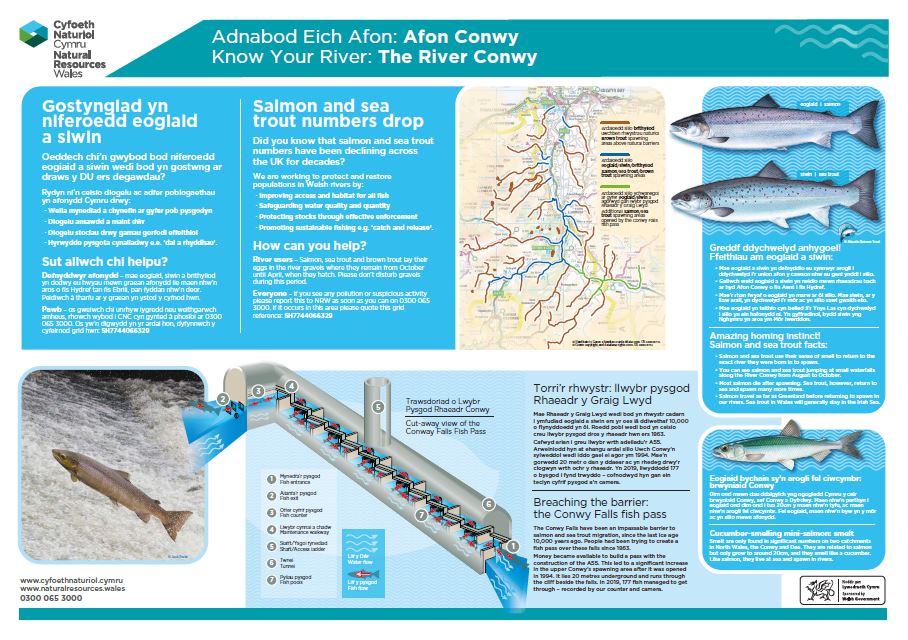
Juvenile salmonid monitoring programme
2020 was a difficult year for us all, and NRW’s ability to carry out monitoring work was no exception. Due to problems with social distancing, it was decided that electro-fishing with generators would not go ahead, but the use of backpack gear could. However, trials in safety meant that the national programme wasn’t carried out, but parts of the Dee juvenile index monitoring could be completed.
Thirty-five of the Dee juvenile index monitoring program sites were completed. Salmon (and in most cases trout) juvenile stocks were much lower in 2020 than that seen in 2019, however the data could have been impacted by the surveys being carried out much later in the year than usual. We expect to have full coverage of North Wales in 2021, however the survey method is still questionable with current covid restrictions.
Conwy – Nant y Gwryd restoration
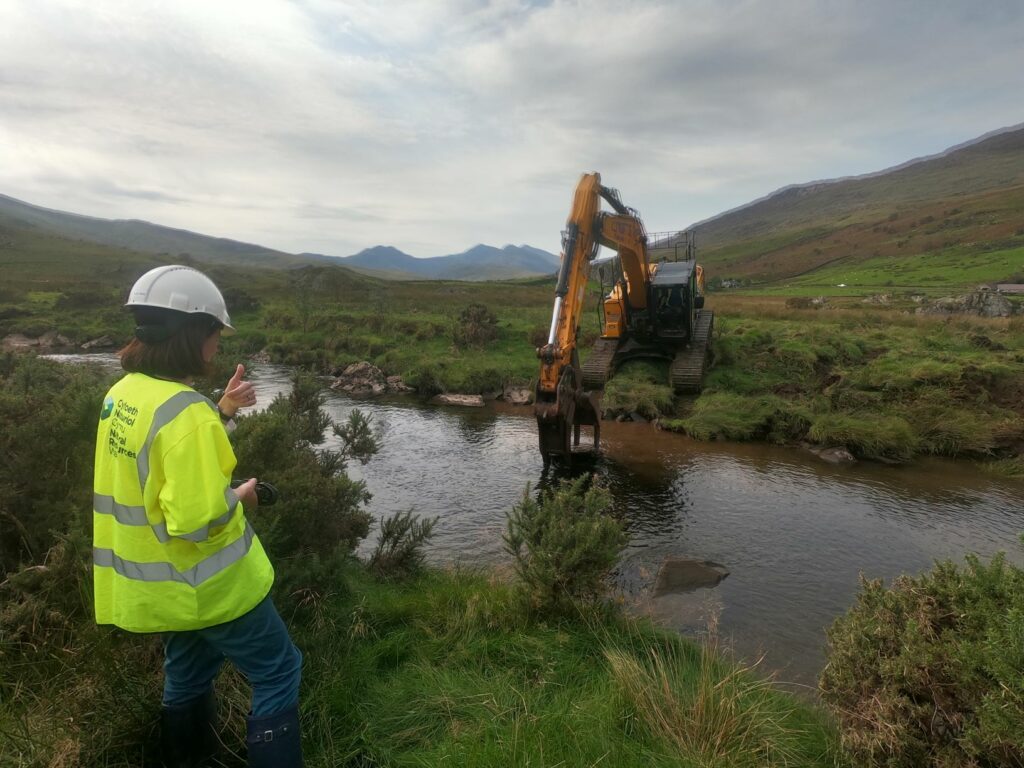
In September, together with our partners the National Trust, we began re-profiling the steep banks and re-positioning some large boulders in a previously modified section of the river.
We are already starting to see some changes, with the river shifting from a straight glide (like a canal) to developing sections of pools (deep water) and riffles (fast flowing areas), with gravel shoals forming around the boulders. This creates a greater variety of features within the river and improves the habitat for spawning fish, such as brown trout and birds such as kingfisher, common sandpiper and dipper.
Seiont – Llyn Padarn Arctic Char stocking
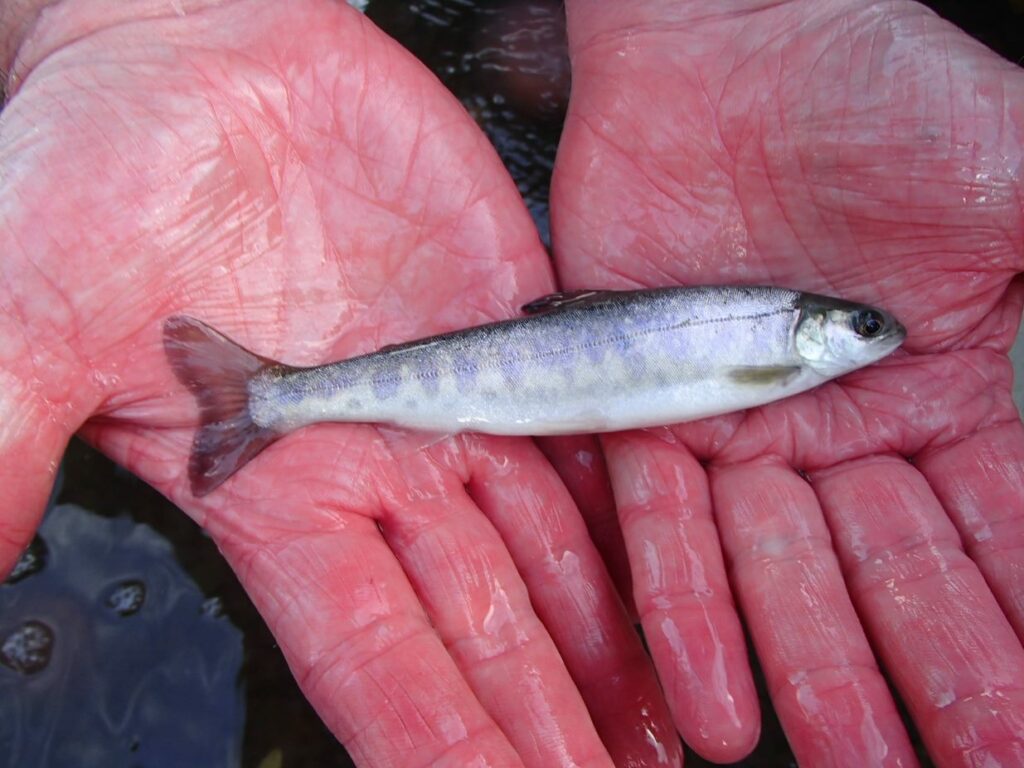
Due to declining numbers of Arctic char in Llyn Padarn, a limited programme of stocking has been in place since 2009. The aim is to enhance and protect Arctic Char numbers. During 2020 around 7500 juvenile Char, reared in Natural Resources Wales’ (NRW) Cynrig Hatchery, have been released into their native lake in Llanberis, Gwynedd. In December 2019, NRW collected Arctic Char eggs from Afon y Bala, which flows into Llyn Padarn. Now, after ten months of care and hard work, the young Char have been released into the lake.
Work has been done over many years to improve water quality in Llyn Padarn, Wales’ only designated inland bathing water, which is now graded as excellent. This work is paying dividends, helping to conserve and enhance these enigmatic fish. We will continue to build on this work so that wildlife continues to thrive in and around Llyn Padarn.
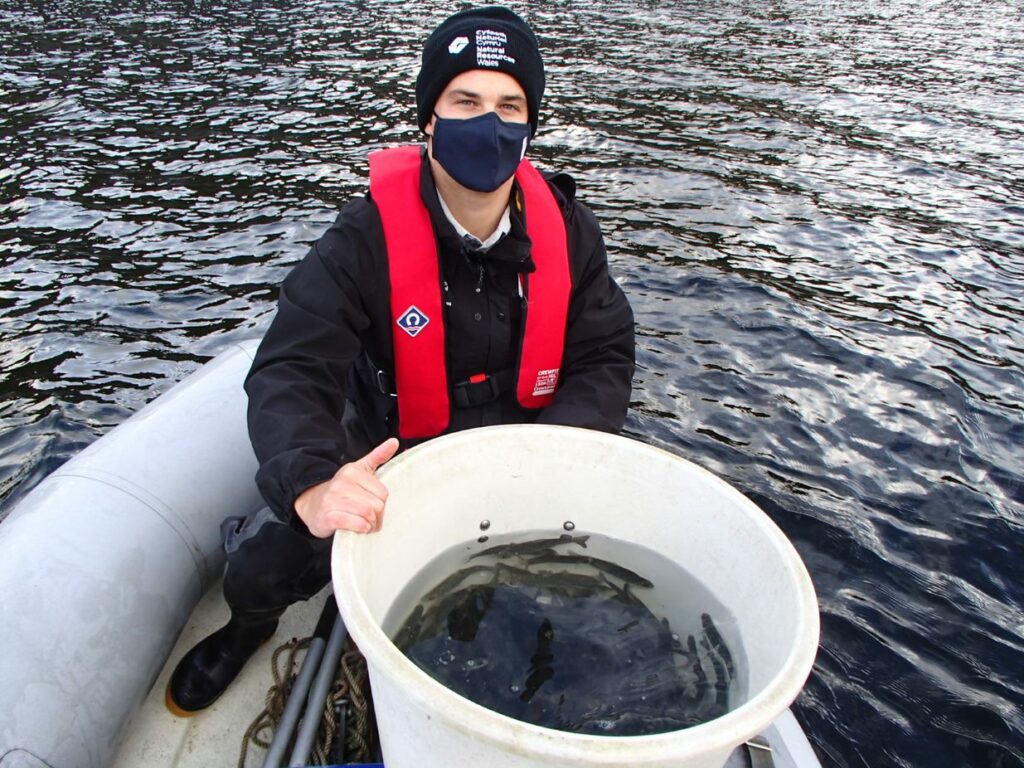
Dee – LIFE Dee river project
The LIFE Dee river project is an ambitious, multi-million- pound river restoration project to transform the River Dee and its surroundings, to help improve declining fish populations and rare wildlife in the area. The £6.8 million, cross-border project will bring multiple benefits to the environment, particularly improving the numbers of salmon, lamprey and freshwater pearl mussels, helping them become more sustainable in the future.
The project was officially online in September 2020, with over 150 attendees, and included presentations and messages of support from Clare Pillman, NRW Chief Executive; Sir David Henshaw, NRW Chair; Hannah Blythyn MS, Deputy Minister for Housing and Local Government; Will Millard, Angling Author and TV Presenter, and Joel Rees-Jones, LIFE Dee River Project Manager.
Dee – Tryweryn LIFE Dee weir removal
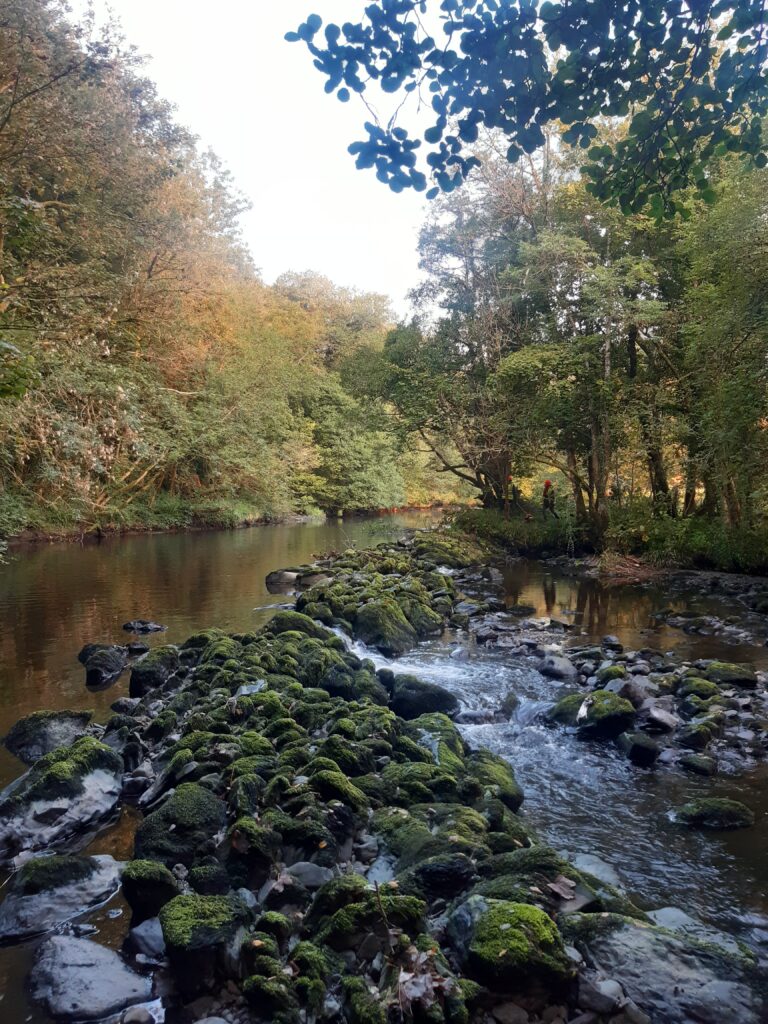
Only a couple of days after launching the project, the team were straight to work and successfully completed their first major milestone, a weir removal on the Afon Tryweryn; a tributary of the River Dee.
Work to dismantle the redundant weir on the Tryweryn was carried out by experienced local contractors, in conjunction with NRW’s technical specialists, to remove the man-made structure and help improve access for fish. Boulders from the weir were redistributed to provide important habitat and spawning areas for the variety of species that live in the river, and were also used to stabilise the riverbed.
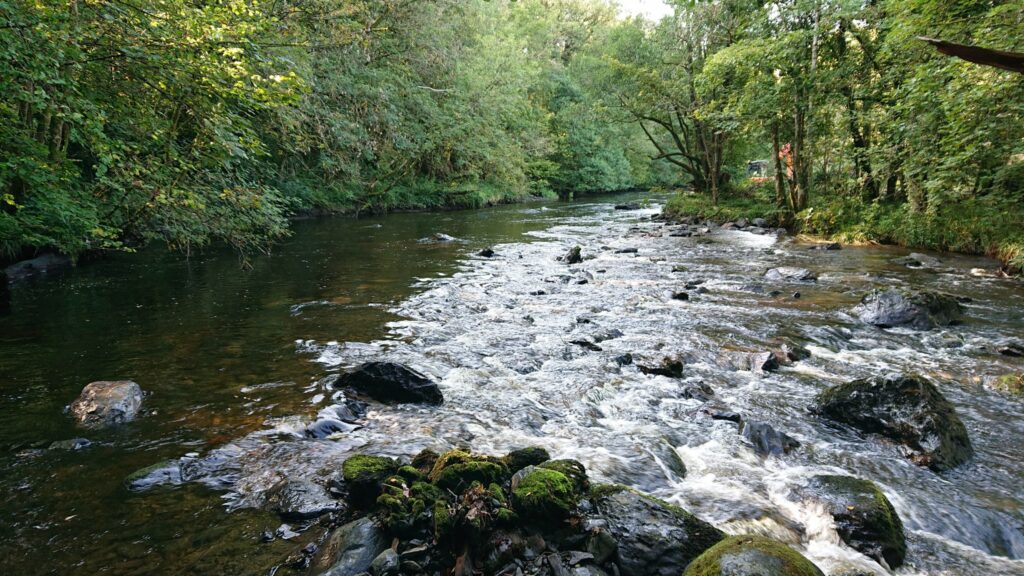
Mawddach – Afon Wen Boulder removal
This scheme has improved fish migration on the Afon Wen, a tributary of the Afon Mawddach, and was completed by NRW contractors. This project aimed to remove a boulder which had plugged a natural obstruction during a 100-year flood event in 2001. The boulder was preventing salmon from migrating upstream to spawn, which was confirmed by electro fishing in the area.
Historically salmon had migrated to the upper reaches of the Afon Wen, where they had been caught by anglers, and spawning had been witnessed by locals and National Rivers
Authority staff. This piece of work has re-opened 4km of spawning habitat for salmon, and we hope to see salmon recolonise the upper Wen over the coming year.
Fisheries habitat restoration surveys
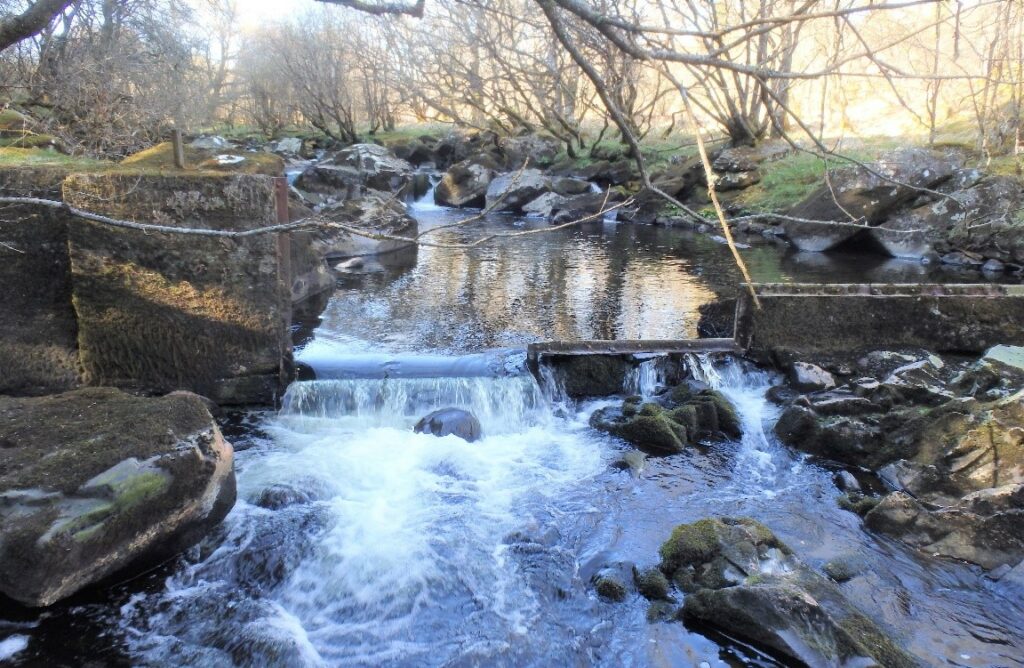
NRW are working with Afonydd Cymru, the North Wales Rivers Trust and the Welsh Dee Trust to undertake habitat restoration survey works on several catchments within North Wales. These include the Glaslyn, Dyfi, Dee, Conwy and various Anglesey catchments. The aim of the surveys is to identify where habitat for fish can be improved.
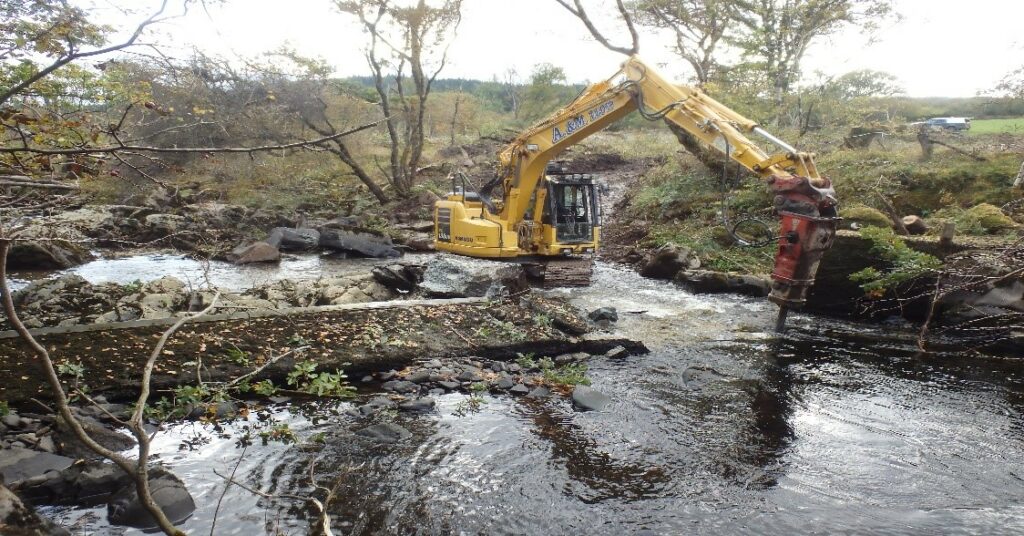
This will provide the relevant information for NRW or partners to be able undertake projects, subject to funding availability, that will improve the quality and quantity of habitat in these rivers for fish.
Mawddach – Afon Eden Llyn Cloc weir removal
Llyn Cloc was a concrete hydrology weir on the Afon Eden, part of the Mawddach catchment. The historic structure was owned by the Nuclear Decommissioning Authority (NDA), and was part of the Ardudwy leat scheme, monitoring water abstraction from the Eden’s tributaries in the 1960’s.
This partial river obstruction was a priority for NRW to remove as it would improve salmon, sea trout and eel migration. Having been given permission by the NDA to demolish the structure, we worked in partnership with the North Wales Rivers Trust to deliver the scheme, funded by Afonydd Cymru.
Increased disabled access for anglers at Llyn Trawsfynnydd
Prysor Angling Association, working with NRW, are aiming to improve access to fishing on Llyn Trawsfynnydd for less able anglers. As part of a suite of improvements, they are undertaking a project that will include improved parking facilities for disabled anglers and purchase of a wheely boat (from the Wheely Boat Trust) that allows full participation of angling from the water.
Mawddach – Afon Gamlan gravel traps
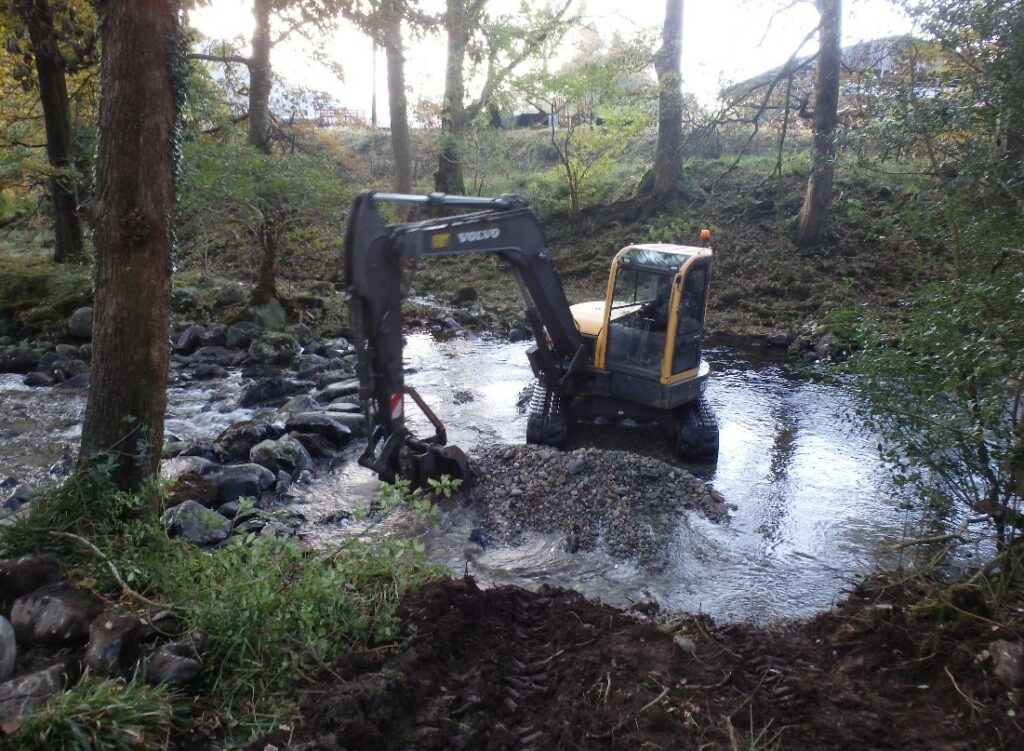
With funding from Sustainable Funding Programme (SFP) two large gravel traps were constructed by NRW’s contractors on the Afon Gamlan, a tributary of the Mawddach catchment. NRW’s fisheries team, along with the Mawddach Trust, have been improving in-river fish habitat by constructing log weirs in active channels to create
pools, cover for fish and create spawning habitat. This scheme was primarily to encourage salmon to spawn on the lower reaches of the Gamlan and involved using large boulders from the site and 70 tons of gravel from a local quarry.
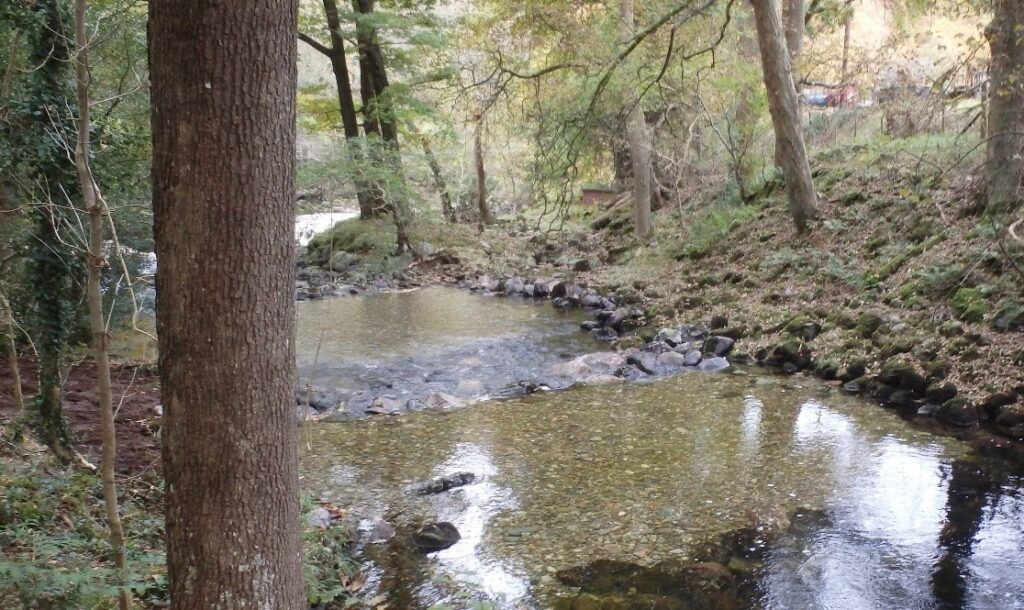
Environmental Crime Officers (ECO’s):
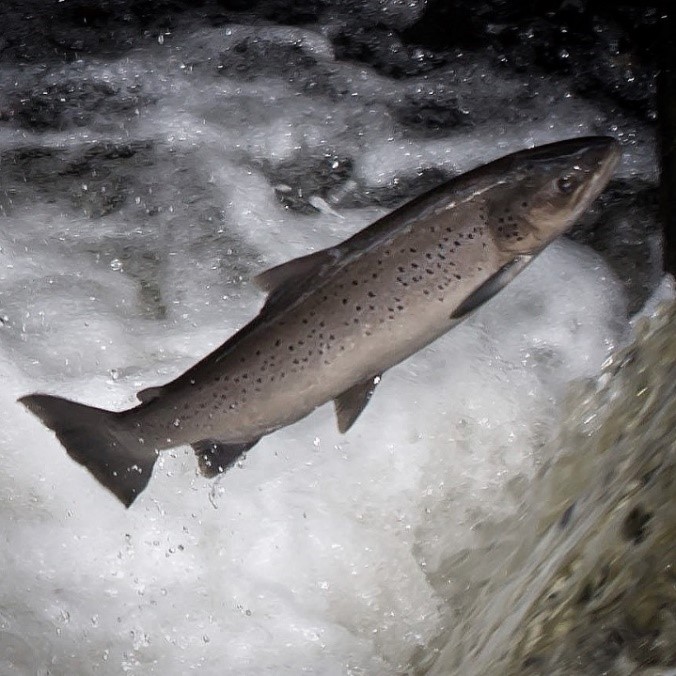
Reducing illegal fishing, acting against environmental crime and illegal waste activity in North West Wales, including:
- Illegal Fishing – land and sea
- Illegal shellfish activity
- Rod licence checks
Due to decreasing numbers of salmon returning to UK waters to spawn, new Wales Rod and Line (Salmon and Sea Trout) Byelaws 2017 are now in place to prevent active salmon fishing, and to ensure that any salmon caught by fishermen are released. Due to the pandemic and the series of lockdowns, fieldwork activity has necessarily been restricted in order to keep both staff and the public safe.
During 2020, ECO’s carried out visible patrols when conditions allowed, to prevent or minimise impacts from illegal bass netting on the Menai Straits, rod licence checks, gold panning and illegal cockling. We have jointly worked with local authorities, WG Sea Fisheries and the NWP Rural Crime team on our higher priority cases during this time in order to disrupt or prevent illegal activity from continuing wherever needed and was safely possible.
Officers will continue to prioritise and react to incidents reported us that require attention. We continue to be heavily reliant on the assistance of both anglers and other members of the public to help us identify offenders, locations and times that these offences are taking place.